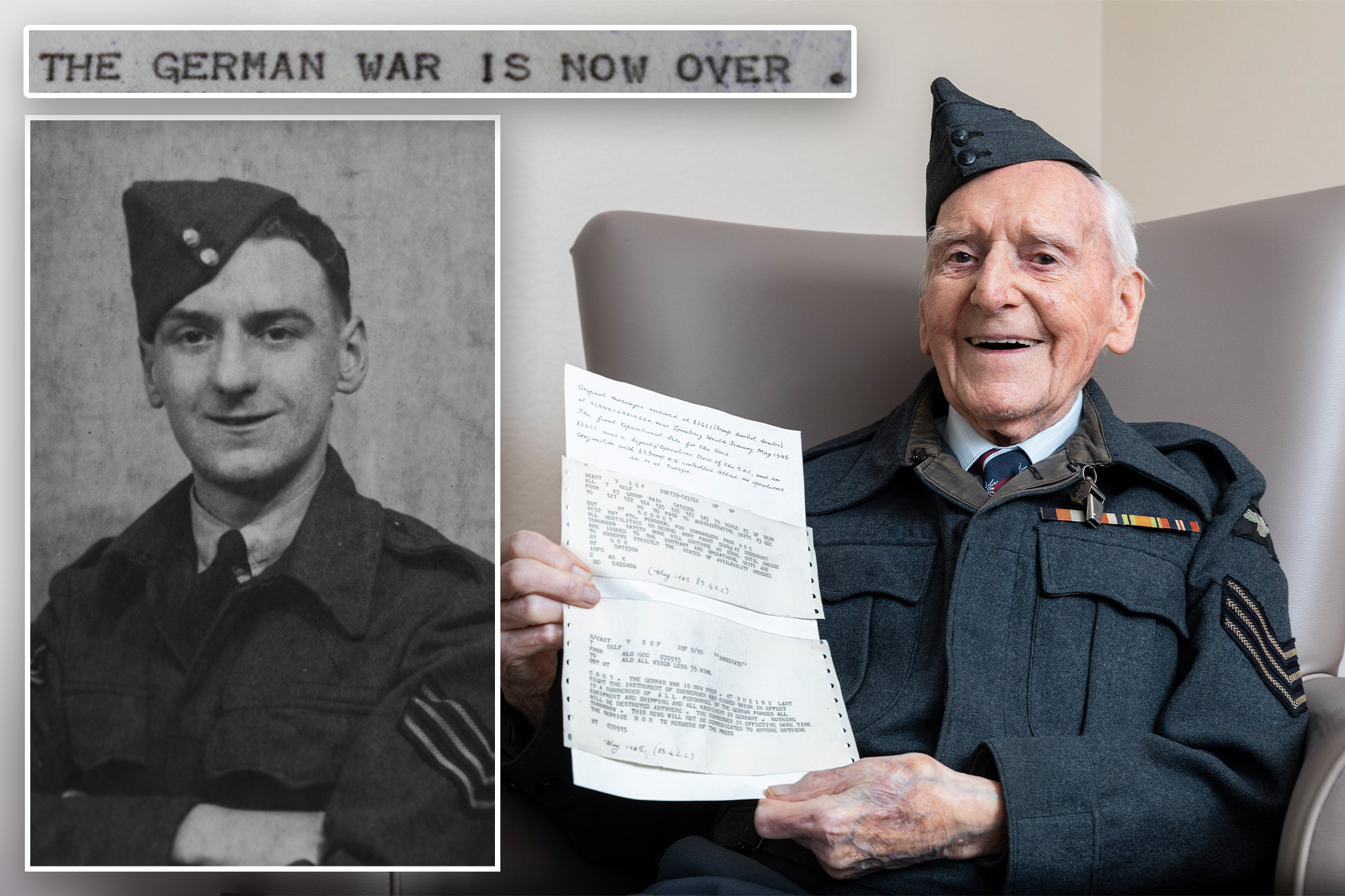
A World War II Veteran who claimed he was the first Allied soldier to receive a message that the Nazis had surrendered vowed to keep the historical document in his family despite intense interest from museums.
Bernard Morgan — who turns 100 on Wednesday — was working as a codebreaker for the Royal Air Force around May 6, 1945, when he received a world-changing message through his Typex machine.
“The German War is now over. At Rheims last night the instrument of surrender was signed which in effect is a surrender of all personnel of the German forces – all equipment and shipping and all machinery in Germany,” the message read, according to The Mirror.
“Nothing will be destroyed anywhere. The surrender is effective sometime tomorrow. This news will not be communicated to anyone outside the service nor to members of the press.”
Morgan first “had to decode” the message while working in the German town of Schneverdingen, located about 200 miles outside of the Reich Chancellery, where Adolf Hitler had committed suicide just days earlier on April 30 in his secret Führerbunker as the Soviet Union’s army closed in on him during the Battle of Berlin.
“It was a surprise. We couldn’t tell anybody until we got the final message to say the war in Germany was now over,” the former service member said.
Following the word that the war in Europe had ended, Morgan said he and members of his codebreaking unit celebrated the end of the bloodiest global conflict in human history while being careful not to attract any attention.
Despite not being able to tell anyone about the news, Morgan said, “It was nice to see that no more soldiers, sailors or airmen were giving their lives… and also to thank the civilians who gave their lives for the same reason.”
It would be 50 years after the war had ended before he was able to tell anyone he was the first Allied service member to receive the word about the surrender of the Third Reich due to a document he signed while working as a codebreaker — which became nulled in 1994.
Before his 100th birthday, Morgan vowed to keep the document showing the Nazi’s surrender in his family, despite much interest from organizations interested in obtaining the historic piece.
“The Imperial War Museum in London and in Manchester both wanted the original copy – they weren’t interested in a photocopy – but I’m keeping it for my family,” Bernard said.
Though he won’t be donating his historic message to any organizations, Morgan, who is also a Royal British Legion Ambassador, said, he’s “always keen for the younger generation to know exactly what went on during the war and to appreciate the sacrifice that our lads made so that we can enjoy the freedoms we have today.”
Morgan, as did around 133,000 heroes of the Second World War, landed on Normandy Beach in France on D-Day — which still stands as the largest amphibious invasion in history.
The RAF sergeant was only 20 years old when had landed on Gold Beach on June 6, 1944.
He would later be transferred to Germany toward the end of the war after the Allies pushed back the once-conquering Nazi army to Berlin.
As a codebreaker, Morgan used the once-classified Type X machine to encrypt messages that told aircraft where they were needed for immediate action before sending the coded messages back to Britain to be implemented, according to The Manchester Evening News.
The Nazis officially surrendered in the late evening of May 8, 1945, after Hitler’s successor, Admiral Karl Dönitz had the heads of the German military sign the unconditional surrender document in France and Berlin — marking an end to the war in Europe.
Though the war in Europe was over, the Second World War would not come to an official end until Sept. 2, 1945, following the surrender of the Empire of Japan.
Upon returning home at the end of the war, Morgan said one thing that struck him was how his being away impacted his parents since he was “their only child.”
“My parents thought the war was like the First World War, ankle-deep in mud, and they never asked what I did in the Air Force.”
After the war, Morgan worked on the railways and as a turnstile operator for Crewe Alexandra, a professional association football club based in Crewe, Cheshire, England, for 57 years.
“We are incredibly proud of dad. He will always be a war hero but he is a brilliant dad, grandad and great-grandad, too,” his daughter, Sheila Morgan said.
Sheila Morgan, 71, also shared that her father plans to return to Normandy in June for the 80th anniversary of D-Day.
“Our D-Day veterans are a dwindling band of brothers, so it is incredibly important that we take every opportunity we can to celebrate the achievements and the bravery of those people who helped to liberate Europe 80 years ago,” said Nancy Kay, Branch Chair for the RBL in Crewe.














